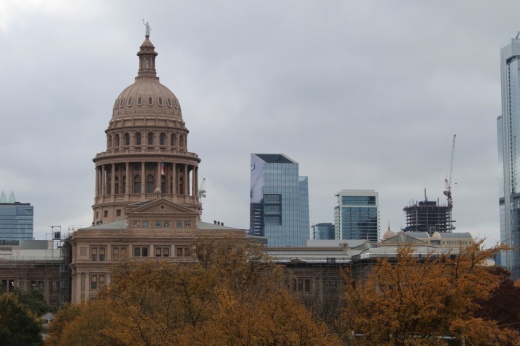What’s happening
Rep. Cody Vasut, an Angleton Republican who chairs the House redistricting committee, said that while lawmakers did not request that Texas’ congressional maps be redrawn during the 30-day special legislative session, it was important to hear from Texans about the potential impacts of redistricting.
“We are here today to hear from the public about what that revision should be, if any,” Vasut told the committee July 24. “We're going to follow the Voting Rights Act, we're going to follow the law, and we have no plans to change any particular district.”
Vasut said no proposed maps would be filed until after lawmakers complete public hearings. The House committee will hold additional hearings July 26 in Houston and July 28 in Arlington, both of which are scheduled to last about five hours. Senators are slated to hear virtual testimony only during hearings on July 26, 28 and 29.
Lawmakers will hold at least one more hearing once a map is available, Vasut said.
Democrats questioned why lawmakers were tackling redistricting during the special session, arguing that lawmakers should prioritize disaster recovery efforts after at least 137 people were killed by the July 4-5 floods in Central Texas. Lawmakers held a nearly 12-hour hearing on the flood response July 23.
“I'm personally very confused about why exactly we're here doing this,” Rep. Gene Wu, D-Houston, told Vasut July 24. “Between the two of us, I don't think we know anything of why we're here.”
Vasut and Senate committee chair Sen. Phil King, R-Weatherford, said lawmakers started the redistricting process at the request of the governor.
During the July 24 House hearing, U.S. Rep. Greg Casar, D-Austin, said he did not think “a single person in the state of Texas” wanted to redraw the state’s congressional maps.
“Many of my Republican colleagues have told me privately that they are deeply concerned with a map being drawn without their input,” Casar said July 25. “You could draw all sorts of crazy maps that ultimately disenfranchise [their] constituents.”
How we got here
Gov. Greg Abbott asked state lawmakers to begin the congressional redistricting process in light of “constitutional concerns” raised by the U.S. Department of Justice. The DOJ said in a July 7 letter that the following U.S. House districts were unconstitutionally gerrymandered based on race:
- TX-09, served by U.S. Rep. Al Green, D-Houston
- TX-18, vacant; last served by Sylvester Turner, who died March 4
- TX-29, served by U.S. Rep. Sylvia Garcia, D-Houston
- TX-33, served by U.S. Rep. Marc Veasey, D-Fort Worth
All U.S. states, including Texas, are constitutionally required to redistrict every 10 years, after a census, based on population growth and redistribution. Texas’ legislative and congressional maps were last updated in 2021, after the 2020 census.
A mid-decade redistricting attempt is rare, but not unprecedented—Texas lawmakers also redrew the state's congressional maps in 2003. U.S. Rep Joaquin Castro, a San Antonio Democrat who served in the Texas House from 2003-13, said doing so again would “disrupt” and “cut up” communities.
“Us Democrats, we left the state for Oklahoma to [attempt to] stop mid-decade redistricting more than 20 years ago. It was wrong then, and it's wrong now,” Castro told the House committee July 24.
Texas House Democrats have floated leaving the state again this year—known as a quorum break—to stop or draw out the redistricting process. A two-thirds majority, or quorum, is needed to conduct business in each legislative chamber, meaning at least 100 House members and 20 senators must be present to vote on motions and pass legislation in their respective chambers.
“With my colleagues, I am prepared to break quorum when the time is right,” state Rep. Gina Hinojosa, D-Austin, told about 100 people at a rally ahead of the July 24 hearing.
According to a news release, 15 House Democrats traveled to California and Illinois on July 25 to speak with the two states’ Democratic governors about federal tax legislation and the redistricting push. Lawmakers said they would return the same day, ahead of the July 26 redistricting hearings.
The latest
The House committee heard from about 40 invited and public witnesses July 24, after which testimony was cut off at about five hours. The Texas House Democratic Caucus invited Texans who did not have the opportunity to testify to speak with lawmakers in a separate meeting room after the official hearing ended.
U.S. Rep. Sylvia Garcia, D-Houston, whose congressional district was mentioned in the DOJ letter, said she was concerned lawmakers were “playing political games” to advance President Donald Trump’s agenda through redistricting.
“We are pretending that [Abbott] did not approve the very maps he's now insisting be changed,” Garcia told the House committee. “This political theater will hurt communities in my district, and it's shameful.”
Trump told reporters July 15 that he wanted Texas to net five new U.S. House seats for Republicans, according to previous Community Impact reporting.
“There could be some other states where we’re going to get three or four or five [seats], in addition,” Trump said on the White House’s North Lawn. “Texas would be the biggest one, and that’ll be five.”
Gabriel Rosales, who leads Texas’ branch of the League of United Latin American Citizens, said the state’s current congressional maps “have diluted the vote of the Latino community for years.” Rosales said he was concerned that drawing new maps with the intent to create more Republican districts would further disenfranchise voters of color.
Vasut told House lawmakers he did not think Texas’ current maps broke federal laws. State officials have also testified in court that they did not consider race when redrawing districts in 2021, according to Fair Maps Texas, a coalition of advocacy groups that opposes mid-decade redistricting.
“I've certainly never seen any indication that any map that has been passed out of this legislature... would violate in any way the Voting Rights Act,” Vasut said July 25. “But again, I'm not a legal expert.”





